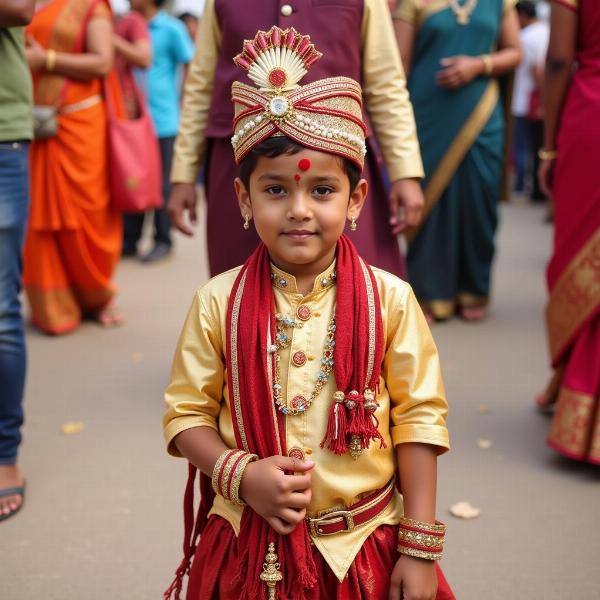Understanding the meaning of “prince” in Hindi goes beyond a simple translation. It delves into cultural nuances, historical context, and the rich tapestry of Indian traditions. While the direct equivalent is often cited as “राजकुमार” (rajkumar), the word carries a weight of significance that transcends its literal definition. This article explores the various facets of “prince” in Hindi, examining its usage in different contexts and shedding light on its cultural implications.
The Royal Lineage: Rajkumar and Beyond
The most common Hindi translation for “prince” is indeed “राजकुमार” (rajkumar). This term is composed of two parts: “राज” (raj), meaning kingdom or rule, and “कुमार” (kumar), meaning son or young man. Thus, “rajkumar” literally translates to “son of the king” or “royal son.” This term is typically used for a male heir to the throne, a prince in the traditional sense.
However, the concept of “prince” extends beyond the immediate heir. Other male members of the royal family, even distant relatives, might also be referred to as “rajkumar.” The specific title and its associated privileges would vary depending on their proximity to the reigning monarch.
Beyond Royalty: Figurative Uses of “Prince”
The term “prince” isn’t confined solely to royalty in Hindi. Figuratively, it can be used to describe someone who exhibits princely qualities, such as nobility, charm, or generosity. A person of high moral character, regardless of their social standing, might be referred to as a “prince” as a mark of respect and admiration.
For example, a kind and benevolent man might be called “राजकुमार जैसा” (rajkumar jaisa), meaning “like a prince.” This highlights the positive connotations associated with the term, extending beyond its literal meaning.
Princely Titles and Variations
Within the royal context, different titles exist to denote variations in rank and lineage. “युवराज” (yuvraj), meaning “crown prince,” refers specifically to the heir apparent to the throne. This signifies the individual designated to inherit the kingdom upon the current ruler’s demise. Other titles might include “महाराजकुमार” (maharajkumar), for the son of a Maharaja (Great King), signifying a higher rank and prestige.
Cultural Significance of Princes in India
Historically, princes played a pivotal role in Indian society. They were not only heirs to the throne but also symbols of power, prestige, and cultural continuity. They were expected to uphold dharma (righteousness), protect their subjects, and patronize the arts. Stories of valiant princes, like Rama and Arjuna, are deeply embedded in Indian mythology and continue to inspire generations.
Prince in Modern India
While the traditional role of princes has diminished in modern India, the term still retains its cultural significance. It often evokes a sense of nostalgia for a bygone era of royal grandeur. In contemporary usage, it might be used playfully or affectionately to address a young boy, particularly one who exhibits charming or princely qualities.
What does “Prince” Mean in Hindi: A Quick Recap
The meaning of “prince” in Hindi is multifaceted. While “राजकुमार” (rajkumar) is the standard translation, the term encompasses a broader range of meanings, from literal designations within a royal family to figurative descriptions of noble and virtuous individuals.
 Meaning of Prince in Hindi: Modern India
Meaning of Prince in Hindi: Modern India
Conclusion
Understanding the meaning of “prince” in Hindi requires appreciating its cultural context and diverse usage. Beyond its literal translation, the term embodies a rich history, symbolic significance, and enduring cultural resonance in India. Whether referring to a royal heir or a noble individual, “prince” in Hindi carries a weight of meaning that extends far beyond a simple dictionary definition.
FAQ
- What is the most common Hindi word for “prince”? The most common Hindi word for “prince” is “राजकुमार” (rajkumar).
- What does “yuvraj” mean? “युवराज” (yuvraj) refers to the crown prince, the heir apparent to the throne.
- Is “prince” only used for royalty in Hindi? No, “prince” can also be used figuratively to describe someone with noble qualities.
- What is the cultural significance of princes in India? Princes have historically been symbols of power, prestige, and cultural continuity in India.
- How is “prince” used in modern India? In modern India, “prince” might be used playfully or affectionately to address a young boy.
Meaning-Hindi.in is your premier destination for high-quality Hindi translation services. We offer a wide range of specialized translation solutions, including business and commercial document translation, certified and legal document translation, technical and user manual translation, website and localization services, and academic translation. Our expert linguists possess a deep understanding of Hindi grammar, literature, and cultural nuances, ensuring accurate and culturally sensitive translations. For all your Hindi translation needs, contact us at [email protected] or call us at +91 11-4502-7584. Meaning-Hindi.in is your trusted partner for bridging the language gap.